Understanding PvP mechanics in multiplayer fantasy adventure games is essential for enhancing competitive gameplay. This article explores combat systems, skill utilization, and effective player strategies. It also addresses challenges like skill disparities and environmental factors. Finally, we will discuss emerging trends shaping the future of PvP experiences.
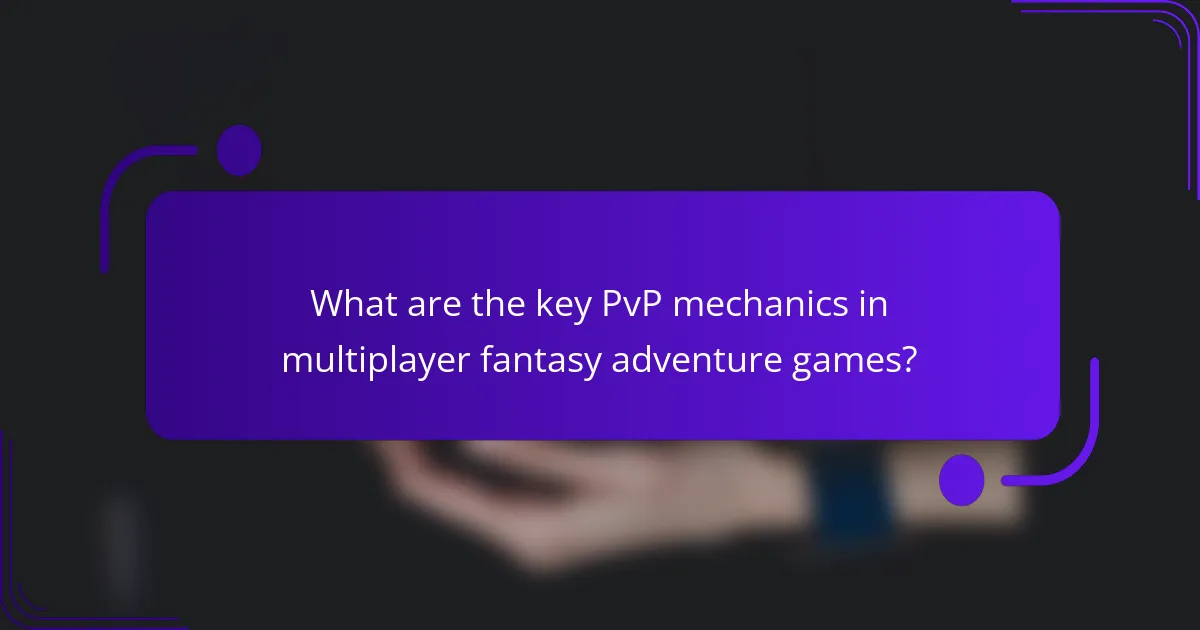
What are the key PvP mechanics in multiplayer fantasy adventure games?
PvP mechanics in multiplayer fantasy adventure games include combat systems, skill utilization, and player strategies. Combat systems often feature real-time or turn-based mechanics, impacting how players engage in battles. Skill utilization allows players to leverage unique abilities, enhancing their effectiveness in PvP scenarios. Player strategies encompass teamwork, positioning, and resource management, which are crucial for success in competitive environments. Unique attributes like arena design and match types further differentiate PvP experiences across games.
How do combat systems influence player interactions?
Combat systems significantly shape player interactions by defining engagement rules and strategic choices. In multiplayer fantasy adventure games, Player versus Player (PvP) mechanics create competitive dynamics that influence teamwork and rivalry.
Effective combat systems encourage players to develop unique strategies, fostering collaboration or competition. For example, classes with distinct abilities can lead to varied team compositions, enhancing interactions through synergy or conflict.
Moreover, the balance of combat mechanics impacts player satisfaction and retention. A well-designed system offers fair challenges, motivating players to improve skills and engage with others. Conversely, poorly balanced mechanics can create frustration, leading to disengagement.
Ultimately, combat systems not only dictate how players interact but also enhance the overall gaming experience by promoting social dynamics and strategic depth.
What role do character classes play in PvP dynamics?
Character classes significantly influence PvP dynamics by defining playstyles and strategies. Each class offers unique abilities and strengths, shaping combat interactions. For instance, a tank class excels in absorbing damage, while a healer supports allies. This diversity creates a balanced ecosystem where team composition and class synergy are vital for success. Additionally, the distinct attributes of each class, such as mobility and crowd control, introduce tactical depth, encouraging players to adapt their approaches according to opponents. Ultimately, understanding character classes enhances PvP engagement and competitiveness in multiplayer fantasy adventure games.
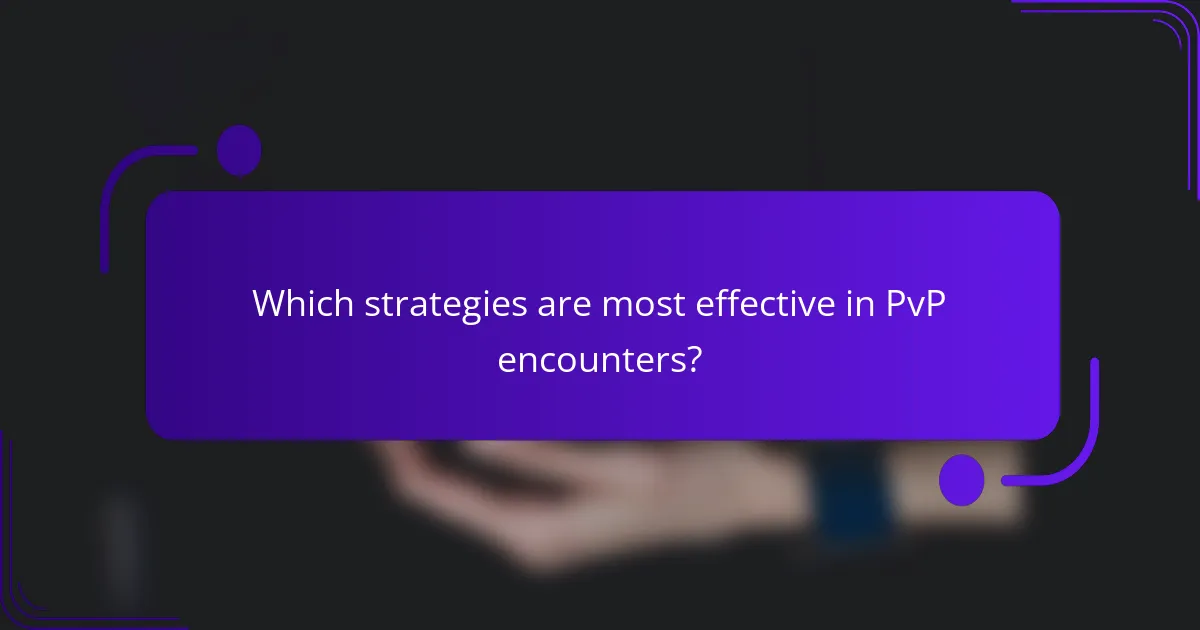
Which strategies are most effective in PvP encounters?
Effective strategies in PvP encounters include mastering timing, utilizing terrain, and coordinating with teammates. Timing your attacks can create openings for critical hits. Terrain awareness allows players to leverage high ground or cover. Team coordination enhances effectiveness through combined abilities. Adapting to opponents’ tactics is also essential for success.
How can players utilize terrain and environment in battles?
Players can utilize terrain and environment in battles by leveraging height advantages, cover, and environmental hazards. Strategic positioning on elevated terrain can enhance attack range and visibility. Using natural cover, such as rocks or trees, can provide protection while ambushing opponents. Environmental hazards like traps or explosive barrels can turn the tide of battle when used effectively. Additionally, players can manipulate the environment to create distractions or block enemy paths, gaining a tactical edge.
What are the advantages of teamwork in PvP scenarios?
Teamwork in PvP scenarios enhances strategy, improves communication, and increases chances of victory. Collaborating allows players to combine strengths and cover weaknesses, creating a more balanced team. Effective teamwork fosters quick decision-making, enabling rapid responses to opponents’ actions. Additionally, shared resources and support can lead to better overall performance in battles.
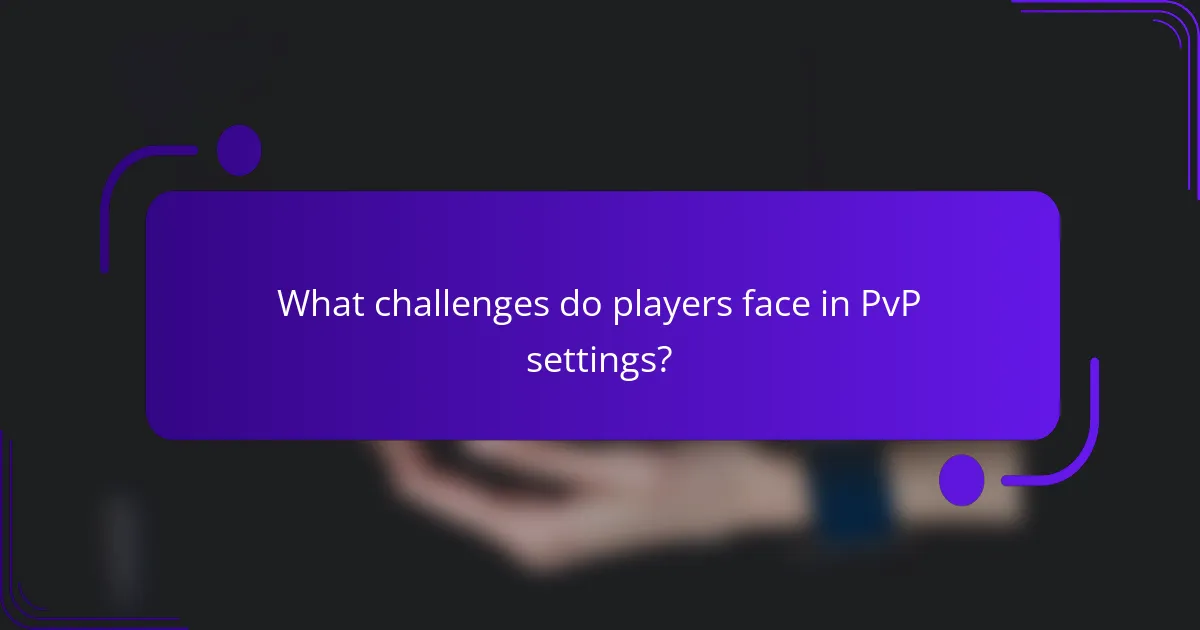
What challenges do players face in PvP settings?
Players face various challenges in PvP settings, including skill disparities, communication issues, and environmental factors. Skill disparities can lead to frustrating encounters where experienced players dominate newcomers. Communication issues arise as teams may struggle to coordinate strategies effectively. Environmental factors, such as map design or spawn points, can also influence gameplay dynamics. Additionally, players may encounter balance issues between character classes or abilities, impacting fairness. Understanding these challenges is crucial for improving performance and enjoyment in multiplayer fantasy adventure games.
How do matchmaking systems impact player experience?
Matchmaking systems significantly enhance player experience by ensuring balanced competition. They pair players of similar skill levels, promoting fair gameplay and reducing frustration. This balance fosters engagement and encourages players to improve their skills. Additionally, effective matchmaking can create diverse and dynamic encounters, enriching the overall game experience. Players often report higher satisfaction when they face opponents with comparable abilities, leading to increased retention in multiplayer fantasy adventure games.
What are common frustrations among players in PvP?
Common frustrations among players in PvP include imbalance in character abilities, lag during matches, and unresponsive controls. These issues disrupt gameplay and diminish the competitive experience. Players often express dissatisfaction with matchmaking systems that create unfair matchups. Additionally, unclear mechanics and lack of communication can lead to confusion and frustration.
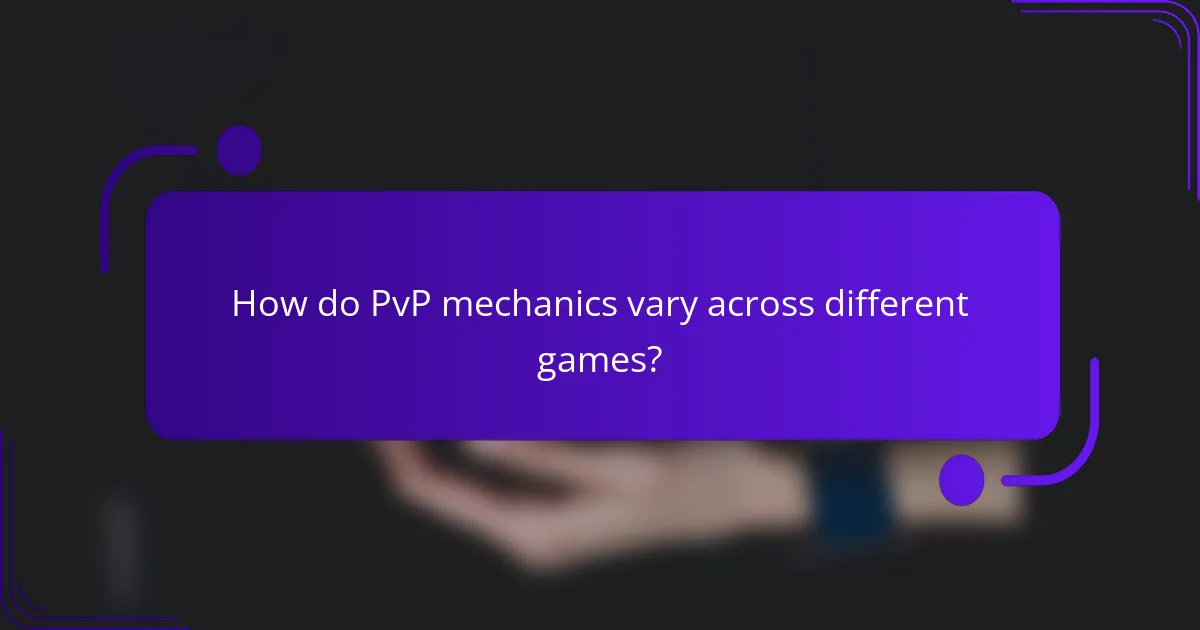
How do PvP mechanics vary across different games?
PvP mechanics in multiplayer fantasy adventure games differ significantly based on gameplay style and design. Some games prioritise skill-based combat, while others emphasise character builds and equipment.
In action-oriented games, real-time combat mechanics create a dynamic experience. Players must master timing and positioning. Conversely, turn-based games focus on strategy, allowing players to plan their moves carefully.
Many games incorporate unique attributes, such as environmental effects or class-specific abilities, enhancing diversity in PvP encounters. Rare mechanics, like territory control or siege warfare, add layers of strategy and team coordination.
Overall, the variety in PvP mechanics shapes player interactions and engagement, making each game distinct in its approach to competition.
What unique features are found in popular titles like “World of Warcraft”?
Popular titles like “World of Warcraft” feature unique PvP mechanics that enhance competitive gameplay. These mechanics include battlegrounds, arenas, and faction-based conflicts. Each of these elements provides distinct environments for players to engage in combat, allowing for various strategies and team compositions. Additionally, unique attributes like honour systems and ranking rewards create a deeper layer of motivation for players to participate in PvP activities. These features contribute to the game’s longevity and community engagement, making PvP an essential aspect of the multiplayer fantasy adventure genre.
How does “Final Fantasy XIV” approach PvP differently?
Final Fantasy XIV approaches PvP with a focus on balanced gameplay and accessibility. Unlike many multiplayer fantasy adventure games, it emphasises structured formats like the Frontline and The Feast, catering to various player skill levels.
The game features unique mechanics such as the ability to switch classes mid-battle, allowing for dynamic strategy adjustments. Additionally, it employs a non-lethal approach to PvP, where players can engage without the risk of permanent character loss, promoting a more casual environment.
Final Fantasy XIV’s PvP rewards system encourages participation through experience points and gear acquisition, enhancing player engagement. This contrasts with traditional systems that often prioritise competitive rankings over player enjoyment.
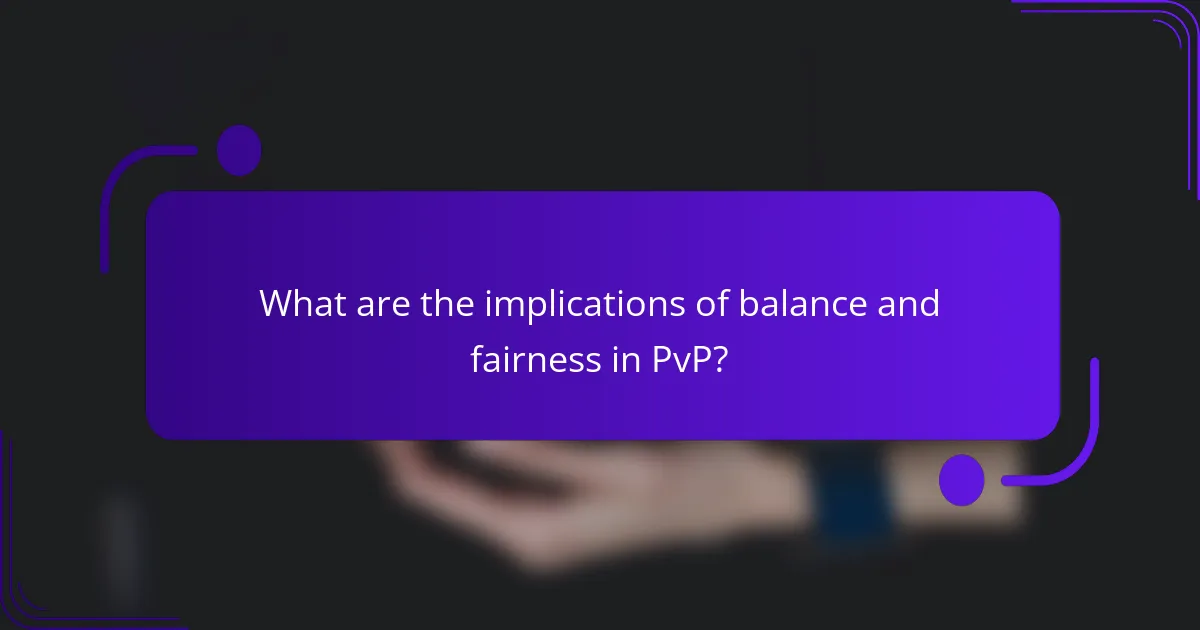
What are the implications of balance and fairness in PvP?
Balance and fairness in PvP are crucial for maintaining player engagement and satisfaction. They ensure that all participants have equal chances of success, fostering a competitive yet enjoyable environment. When balance is achieved, players are more likely to invest time and effort into mastering their skills and strategies. Fairness minimises frustration, promoting a sense of community and collaboration among players.
The implications extend to game design, where developers must continually assess and adjust mechanics to avoid dominance by specific characters or strategies. This ongoing adjustment process is vital for sustaining long-term player interest and maintaining a healthy game ecosystem.
In summary, balance and fairness directly influence player retention and the overall success of PvP mechanics in multiplayer fantasy adventure games.
How do developers address power imbalances?
Developers address power imbalances in PvP mechanics by implementing balanced character attributes and skill systems. They often adjust damage outputs, cooldowns, and abilities to ensure fair competition. Regular updates and player feedback help refine these mechanics. Additionally, matchmaking systems pair players of similar skill levels, reducing disparities.
What impact does game design have on competitive integrity?
Game design significantly influences competitive integrity by shaping player interactions and balancing gameplay. Effective PvP mechanics ensure fairness, promote skill-based outcomes, and minimise exploitative strategies. For example, well-designed matchmaking systems create equitable competition, while balanced character abilities prevent dominance by any single entity. Additionally, transparent rules and consistent updates help maintain player trust and engagement. Ultimately, thoughtful design fosters a competitive environment that rewards strategy and skill, essential for sustaining player interest in multiplayer fantasy adventure games.
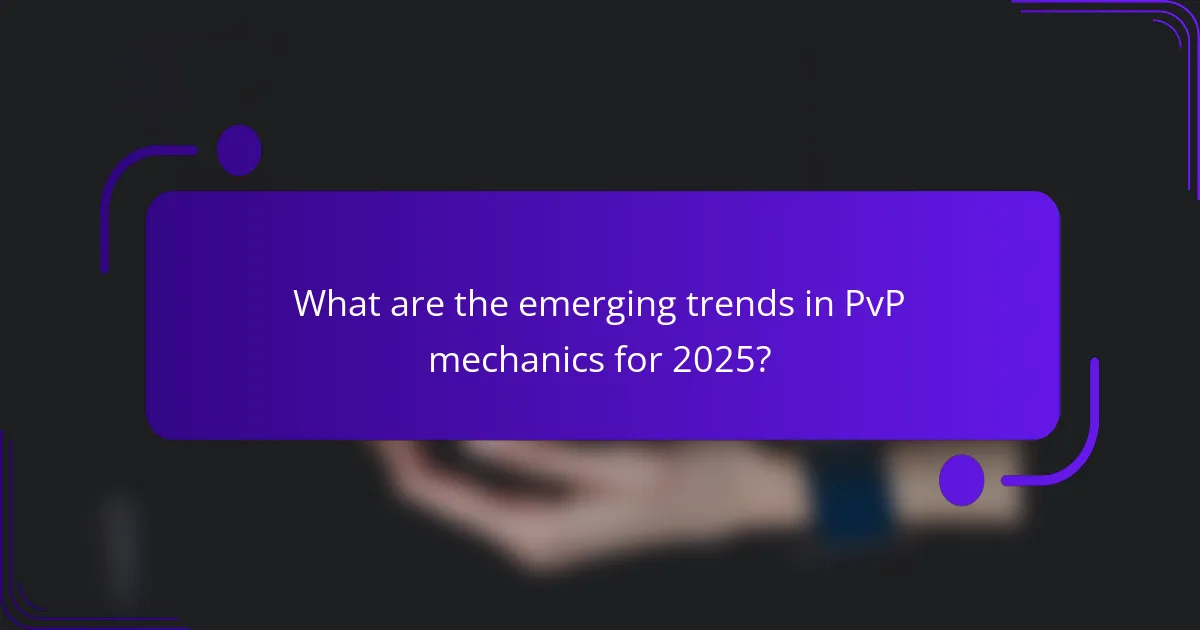
What are the emerging trends in PvP mechanics for 2025?
Emerging trends in PvP mechanics for 2025 focus on dynamic environments, enhanced player customisation, and AI-driven matchmaking. These innovations aim to create more engaging and competitive experiences.
Dynamic environments will introduce real-time changes affecting gameplay, such as weather or terrain shifts. Enhanced player customisation will allow deeper personalisation of abilities and strategies, fostering unique playstyles. AI-driven matchmaking will analyse player behaviour, ensuring balanced matches and reducing frustration.
These trends reflect a shift towards more immersive and personalised PvP experiences, enhancing player engagement and satisfaction.
How is technology shaping future PvP experiences?
Technology is revolutionising PvP experiences in multiplayer fantasy adventure games by enhancing interactivity and immersion. Advanced matchmaking algorithms improve player pairing, ensuring balanced competition. Real-time analytics provide insights into player performance, enabling tailored strategies. Additionally, augmented reality and virtual reality technologies create more engaging environments, enriching the combat experience. Cloud gaming facilitates seamless access across devices, allowing players to compete anytime, anywhere. As a result, these innovations significantly elevate the overall PvP dynamics and player satisfaction.
What innovations are being introduced in player engagement?
Innovations in player engagement for PvP mechanics include enhanced matchmaking algorithms, dynamic event systems, and personalised rewards. These advancements improve competitive balance, increase player retention, and foster community interaction. For example, real-time feedback systems provide players with insights on performance, encouraging skill development and strategic play. Additionally, cross-platform play expands player bases, enhancing the social aspect of multiplayer experiences.
What best practices can enhance PvP performance?
To enhance PvP performance in multiplayer fantasy adventure games, players should focus on strategy, skill development, and teamwork. Prioritise mastering game mechanics, such as timing and positioning, to gain an edge.
1. Understand character abilities and strengths to optimise combat effectiveness.
2. Practice reflexes and decision-making to improve reaction times during encounters.
3. Communicate effectively with teammates to coordinate attacks and defences.
4. Analyse opponents’ strategies to exploit weaknesses and anticipate moves.
These best practices foster a competitive environment, improving overall PvP outcomes.